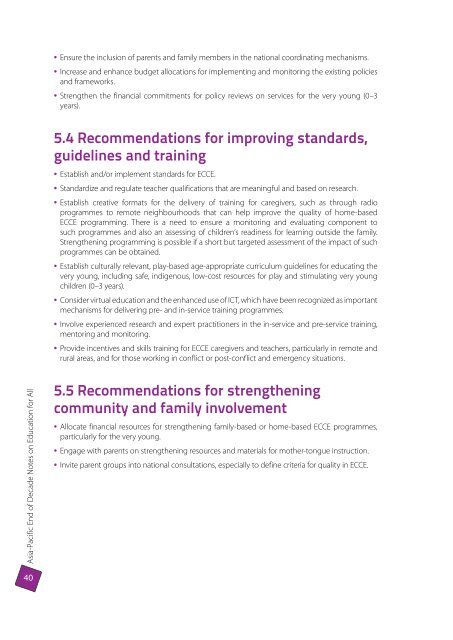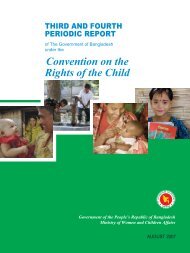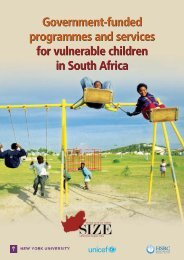EFA Goal 1: Early childhood care and education; Asia ... - Unicef
EFA Goal 1: Early childhood care and education; Asia ... - Unicef
EFA Goal 1: Early childhood care and education; Asia ... - Unicef
You also want an ePaper? Increase the reach of your titles
YUMPU automatically turns print PDFs into web optimized ePapers that Google loves.
Ensure the inclusion of parents <strong>and</strong> family members in the national coordinating mechanisms.<br />
Increase <strong>and</strong> enhance budget allocations for implementing <strong>and</strong> monitoring the existing policies<br />
<strong>and</strong> frameworks.<br />
Strengthen the financial commitments for policy reviews on services for the very young (0–3<br />
years).<br />
5.4 Recommendations for improving st<strong>and</strong>ards,<br />
guidelines <strong>and</strong> training<br />
Establish <strong>and</strong>/or implement st<strong>and</strong>ards for ECCE.<br />
St<strong>and</strong>ardize <strong>and</strong> regulate teacher qualifications that are meaningful <strong>and</strong> based on research.<br />
Establish creative formats for the delivery of training for <strong>care</strong>givers, such as through radio<br />
programmes to remote neighbourhoods that can help improve the quality of home-based<br />
ECCE programming. There is a need to ensure a monitoring <strong>and</strong> evaluating component to<br />
such programmes <strong>and</strong> also an assessing of children’s readiness for learning outside the family.<br />
Strengthening programming is possible if a short but targeted assessment of the impact of such<br />
programmes can be obtained.<br />
Establish culturally relevant, play-based age-appropriate curriculum guidelines for educating the<br />
very young, including safe, indigenous, low-cost resources for play <strong>and</strong> stimulating very young<br />
children (0–3 years).<br />
Consider virtual <strong>education</strong> <strong>and</strong> the enhanced use of ICT, which have been recognized as important<br />
mechanisms for delivering pre- <strong>and</strong> in-service training programmes.<br />
Involve experienced research <strong>and</strong> expert practitioners in the in-service <strong>and</strong> pre-service training,<br />
mentoring <strong>and</strong> monitoring.<br />
Provide incentives <strong>and</strong> skills training for ECCE <strong>care</strong>givers <strong>and</strong> teachers, particularly in remote <strong>and</strong><br />
rural areas, <strong>and</strong> for those working in conflict or post-conflict <strong>and</strong> emergency situations.<br />
<strong>Asia</strong>-Pacific End of Decade Notes on Education for All<br />
5.5 Recommendations for strengthening<br />
community <strong>and</strong> family involvement<br />
Allocate financial resources for strengthening family-based or home-based ECCE programmes,<br />
particularly for the very young.<br />
Engage with parents on strengthening resources <strong>and</strong> materials for mother-tongue instruction.<br />
Invite parent groups into national consultations, especially to define criteria for quality in ECCE.<br />
40

















